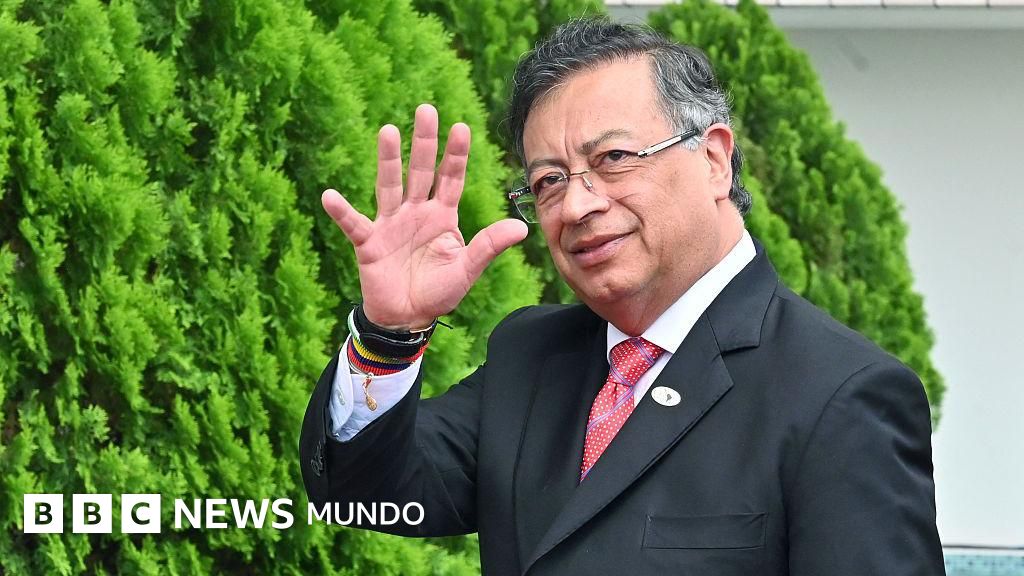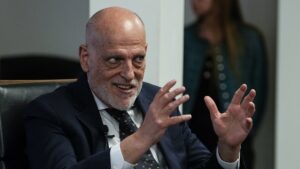

Image source, Getty Images
-
- Author, José Carlos Cueto
- Author's title, BBC News world correspondent in Colombia
- X,
Countries of the Global South, led by Gustavo Petro, want to be heard from Colombia.
The Colombian president hosts until Wednesday in the capital, Bogotá, an emergency summit of the Hague Group on the situation in Gaza.
The objective, according to this set of countries founded in January 2025 and composed of Bolivia, Colombia, Cuba, Honduras, Malaysia, Namibia, Senegal and South Africa “is to move from the statements to the actions” in what they consider “genocidal acts” of Israel in the strip and other Palestinian territories.
In addition to the Member States, the appointment has the representation of 30 countries, including Spain, and the presence of Francesca Albanese, the United Nations Rapporteur over the Palestinian territories that was recently sanctioned by the United States.
The reception of the event by Petro is consistent with the line he has maintained since the exacerbation of the Palestinian-Israeli conflict in October 2023, after Hamas's military incursion that left about 1,200 dead people and another 251 as hostages.
Israel's response in Gaza, which so far has left more than 57,800 dead, led the Colombian government to break diplomatic relations with Israel in the spring of 2024.
That was interpreted as a radical turn in Colombian foreign policy, very aligned in recent decades with Israel and the United States, a power with which the South American country also does not live its best days since Donald Trump returned to the White House.
But what will this summit have and what does the Colombian president seek welcoming it?
Uncertain effect
That Petro intends to transform Colombia's global position is a fact.
His government was integrated into the Chinese foreign policy project of the Strip and the Route, broke diplomatic relations with Israel, approached monarchies such as Qatar or United Arab Emirates and openly questioned Trump and the US for their immigration policy.
The latter was believed unthinkable in Colombian foreign relations, which for decades have moved at an almost identical rate to those of Washington, the main commercial and strategic partner of the South American nation.
To host this openly critical conference with Israel follows that alternative route that Petro represents in Colombia, although experts consulted by BBC Mundo doubt the real effect it may have.
“I think it is very little, not to say null,” he analyzes for BBC Mundo Sandra Borda, professor of the Department of Political Science and Global Studies at the University of the Andes of Colombia.
“If the US, the main contributing of Armas of Israel, managed to contain them very little during the previous era of Joe Biden, less I think this set of countries in the Global South, especially with this new Trump government,” adds the analyst.

Image source, Getty Images
What concrete action will derive from this summit is to be seen, as well as its hypothetical application.
On July 8, in a column published in the British newspaper The GuardianPetro announced that the objective was “to introduce concrete legal, diplomatic and economic measures that can stop the destruction of Israel” in Gaza.
Fire -to -fire calls from the United Nations, sentence to Israel by the International Court of Justice and arrest orders of the International Criminal Court against Israeli Prime Minister Benjamin Netanyahu, and former Defense Minister Yoav Gallant have proven to have little effect on Tel Aviv operations in the Strip.
These precedents reinforce the idea of researchers such as Borda, who, in any case, value the “political and symbolic effect that voices from the Global South have a joint position that they can express” on Gaza and Israel.
“The Hague Group has the potential to show not only a coalition, but a new moral center of world policy,” Albanese said on July 15 in Bogotá.
Petro's double purpose
Petro, the first leftist president of Colombia's modern history, has been, together with Gabriel Boric in Chile and Luiz Inacio Lula da Silva in Brazil, one of the leaders of Latin America who has condemned Israel more forcefully for his policies towards the Palestinians.
Supporting the Palestinian cause, a traditional trend in the Latin American left, had not been the obvious position of previous conservative court governments, although Colombia protested several times before the UN for many attacks and the Israeli occupation of Palestinian territories.
Colombia's greatest gesture towards the Palestinian people prior to the Petro era had been to recognize the Palestinian territories as a state in the last year of the administration of Juan Manuel Santos in 2018.
In this sense, Borda believes that Petro here, in addition to being faithful to his ideas, also “massages its internal constitution, of the hard left, which has always maintained a proper position and that had never found in the establishment of Colombian foreign policy prior an opportunity to express its solidarity.”
“I think this is something designed to promote the international leadership of the figure of Petro and not the country,” says the academic.

Image source, Getty Images
The president's critics do not lose sight of the fact that his time in the government is exhausted.
Colombia will celebrate presidential elections in 2026 and several analysts expect that, therefore, the breakdown of relations with Israel, as well as the current tension with the US, would be short -term and non -permanent events.
“It is not unlikely that an upcoming government will take a different course and resume ties with Israel,” Sergio Guzmán, director of the Colombian consultant Risk Analysis, tells BBC.
The Ministry of Foreign Affairs has been one of the most unstable institutions in these almost three years that Petro accumulates at the head of the Colombian government.
Three ministers whose exits were not exactly easy.
The first, Álvaro Leyva, is today one of Petro's most staunch critics. Of the second, Luis Gilberto Murilllo, the Colombian press reported discrepancies with the president in his last days in office at the beginning of 2025.
The last one, Laura Sarabia, considered Petro's right hand, resigned at the beginning of July as she unmarking the “direction of the government.”
Today the Chancellor is Rosa Yolanda Villavicencio, appointed on July 9.
Given the instability in a key position for the image of Colombia before the world, Borda asks “to evaluate whether (to host the summit for Gaza) or not the international interests of the country” in the long term.

Image source, Getty Images
The future of Colombia-Israel-EE.UU.
When Petro announced in autumn of 2024 that Colombia would join the Strip and the Route of China, the analyst Guzmán predicted possible turbulence in this country's relationship with the United States, especially if Trump won the elections.
His predictions, somehow, were fulfilled.
The ideological differences between the two presidents reached a critical point in January, when Petro returned an airplane with Colombian deportees to the US and the leaders threatened each other with a commercial war.
That crisis was solved after a few frantic negotiations and both governments consolidated weeks later cooperation and migration cooperation agreements, but there is a mutual distrust that does not dissipate.
At the beginning of July, the US Secretary of State, Marco Rubio, called on the US business manager in Bogotá, John T. McNamara, to “urgent consultations after unfounded and reprehensible statements from the highest levels of the Colombian government.”
Petro responded by calling his ambassador to Washington, Daniel García-Peña.
Since then the situation seems to have calm and Borda thinks that the US will not react to this summit, although they “take note.”
Although he also does not believe that Colombia's decisions in foreign policy should be taken “based on whether or not the US likes it.”

Image source, Getty Images
“It is not a valid criterion for an autonomous foreign policy like the one we should have,”
Marcos Peckel, executive director of the Confederation of Jewish communities in Colombia, once spoke to BBC Mundo about the “strategic triangle” that the South American country formed with Israel and the USA, founded in “a powerful cooperation” in security.
Today he is confident that these steps of Petro serve more to a “foreign government and not state policy.”
“It is expected that with another president the relations (with Israel) to normalize again. Having normal relations does not prevent the government from criticizing Israel, as demonstrated by very hostile governments with Israel such as Chile, Turkey or South Africa, which they consider important to maintain an interlocution,” says Peckel to BBC Mundo.
“To talk about peace and coexistence, it is necessary to be able to speak with the two parties (Israel and the Palestinians),” says the analyst.
The future of the Colombia-Israel-EE.UU triangle. It seems then of the 2026 elections, although if Petro has demonstrated, it is its unpredictability and cunning to promote its change of change both inside and outside the country.
To change, precisely, they voted for it in 2022.

Subscribe here To our new newsletter to receive every Friday a selection of our best content of the week.
And remember that you can receive notifications in our app. Download the latest version and act.





